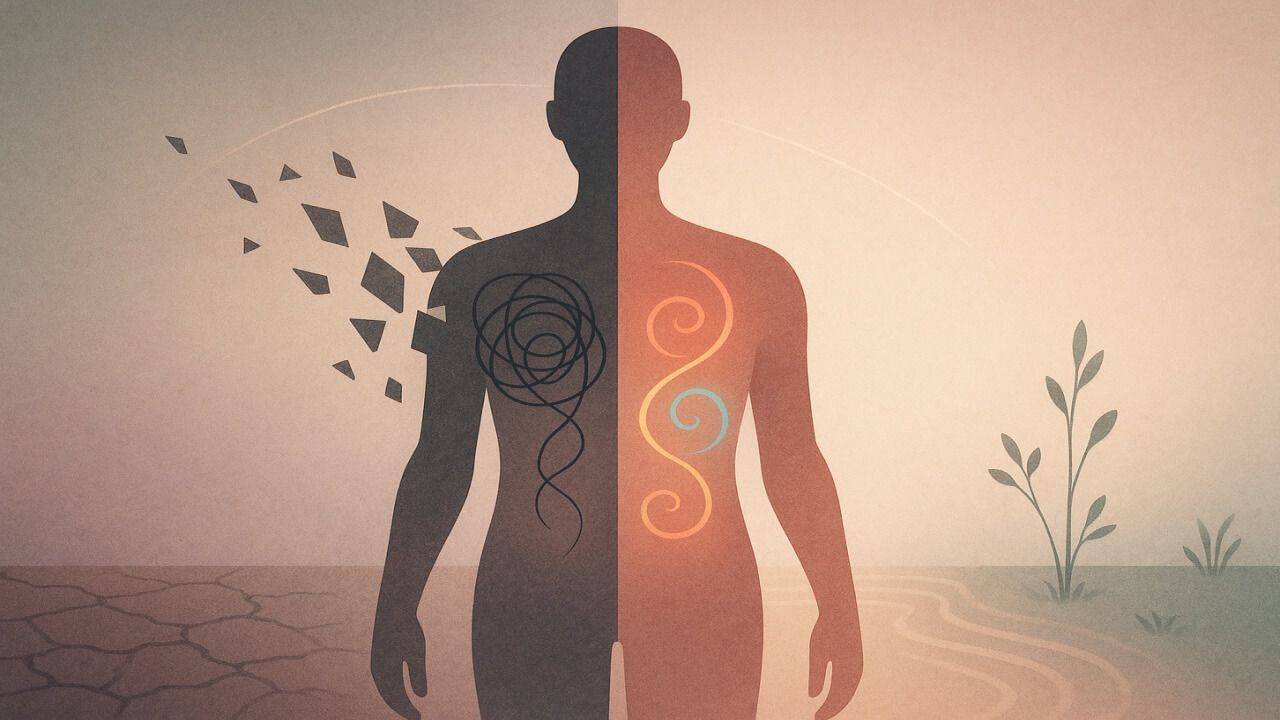Discover the Ayurvedic path to understanding disease

This post is for general informational purposes only and may include affiliate links. It is not intended as medical advice. We may earn a commission through qualifying purchases. Read the full disclaimer.
Rethinking what it means to be well
When we think about disease, it’s easy to focus only on the symptoms such as pain, fatigue, or a diagnosis. But what if we shifted our understanding entirely? What if disease wasn't just something that happens to us, but something that arises from deeper imbalances within? That’s the vision Ayurveda offers. And once you begin to see from this new perspective, the whole picture of health and healing transforms.
Ayurveda, the world’s oldest holistic health system, describes the disease process as arising from internal disharmony rather than external forces. It's a sense of dis-ease in the most literal way. It's a complex dance between body, mind, and consciousness. When these three are out of alignment, disease can manifest. When they are in harmony, a foundation for true health emerges.
The roots of disease go deeper than symptoms
According to Ayurveda, disease doesn’t begin with a runny nose, a rash, or a troubling test result. These are surface expressions. The real process begins much earlier in the subtle shifts within the body’s energy and balance systems that govern our health.
There are three core contributors to the disease process in Ayurvedic understanding:
- Mental and emotional imbalances
- External physical and environmental influences
- Spiritual or cosmic influences
Each of these interacts with our mind, body, and spirit. Whether it's long-term stress, changes in climate, food choices, or influences beyond our understanding, disease usually stems from a combination of many factors.
This is why addressing symptoms alone often falls short. Healing involves uncovering and correcting the imbalances at the source.
Why the mind is the first place to look
So much of our health begins with the state of our mind. Ayurveda recognizes psychological and emotional factors as a foundational cause of disease. Emotions like fear, anger, grief, jealousy, and chronic stress affect the nervous system, digestion, and the body's energy field.
Science has echoed these ideas. Researchers like Candace Pert and Bruce Lipton have explored how emotions impact our cellular biology, showing how our internal landscape can change our hormones, immune function, and even gene expression.
This connection explains why conditions like anxiety, sleep disruption, and chronic worry can lead to digestive distress, fatigue, and lowered immunity. True healing requires us to care for our minds as much as our bodies.
External factors play a powerful role
Our surroundings shape our health in powerful ways. From the food we consume and the air we breathe to the products we use and the environments we live in, everything contributes to our well-being.
Ayurveda teaches that our constitutional type, or dosha, responds uniquely to different environments. For instance, a person with a dry, light Vata nature may not thrive in a cold, windy desert climate. When we understand our dosha and adjust our environment and habits accordingly, health becomes easier to maintain.
The role of the doshas in disease formation
Ayurveda teaches that health arises when three biological energies known as doshas are in balance. These are Vata, Pitta, and Kapha:
- Vata represents air and ether. It governs movement, communication, and the nervous system.
- Pitta represents fire and water. It governs digestion, transformation, and metabolism.
- Kapha represents water and earth. It governs structure, lubrication, and stability.
When one or more doshas fall out of balance, the body begins to shift away from wellness. Vata, due to its connection with prana (life force), contributes to a significant percentage of these imbalances.
Here are some common signs that each dosha may be imbalanced:
- Vata imbalance results in dryness, anxiety, constipation, sleep disturbances, bloating, or restlessness.
- Pitta imbalance appears as inflammation, skin sensitivity, ulcers, or acidity.
- Kapha imbalance leads to sluggishness, weight gain, congestion, and emotional heaviness.
Recognizing your constitutional makeup and the dominant patterns in your symptoms helps guide the healing process with more precision.
The importance of agni, your digestive fire
One of Ayurveda’s central teachings is the concept of Agni, or digestive fire. Agni governs both the digestion of food and the processing of thoughts, emotions, and life experiences.
When Agni functions well, we digest nutrients, eliminate waste properly, and maintain a balanced metabolism. But when it weakens or becomes erratic, food and experiences become Ama, or undigested residue, that can collect as toxic buildup.
Ama is considered one of the main drivers of disease. It can block the body's natural pathways, affect organ function, and lead to inflammation. Practices such as mindful eating, seasonal cleansing, and proper food combining are all ways to nourish Agni and avoid Ama.
Ojas, the essence of vitality
While Agni is the fire that transforms, Ojas is the essence that results from well-digested food and experience. Ojas provides vitality, immunity, resilience, and mental clarity. It is what gives us the strength to thrive, not just survive.
When Ojas becomes depleted, we experience fatigue, overwhelm, fogginess, and reduced physical endurance. Stress, irregular routines, and overexertion gradually wear it down.
Supporting Ojas means more than good nutrition. It also includes quality sleep, calm environments, nourishing relationships, and space for peace and stillness.
The seven tissues and how disease develops
Ayurveda teaches that disease moves through the body's seven tissues, called Dhatus. These are:
- Rasa – Lymph
- Rakta – Blood
- Mamsa – Muscle
- Meda – Fat
- Asthi – Bone
- Majja – Bone marrow and nervous system
- Shukra/Artava – Reproductive tissue
When digestion weakens or toxins form, these tissues are the first to be impacted. Early signs might include low energy or poor muscle tone, and if left unaddressed, these can lead to deeper conditions affecting fertility, immunity, or emotional health.
By caring for these tissues through consistent nourishment, sleep, movement, and clear thinking, we lay the foundation for long-term wellness.
The mind-body connection matters more than we think
Ayurveda emphasizes that mind and body are inseparable. Ongoing stress, emotional turmoil, and unresolved pain influence not just our thoughts, but also our physical health.
When the mind is in turmoil, it affects digestion, immune strength, and energy levels. Over time, this can contribute to inflammation, fatigue, and emotional instability.
Emotions such as anger, fear, or grief when they linger for long periods can disturb all three doshas. Developing mental clarity, peace, and emotional resilience is one of the most important things we can do for our physical health.
Simple choices that build lasting resilience
Healing and prevention come from the small things we do every day. Some of the most impactful Ayurvedic habits for maintaining balance and avoiding disease include:
- Eat foods that match your dosha to reduce stress on digestion and support balance
- Support digestion by eating in calm settings, free from distractions and rushed energy
- Live in sync with nature by sleeping early, rising with the sun, and adjusting to the seasons
- Cleanse regularly using seasonal detoxes to help eliminate accumulated waste
- Cultivate clarity and stability in the mind through breathwork, meditation, and reflection
- Protect your vitality by prioritizing rest, joyful moments, and meaningful connection
Returning to balance and wholeness
Ayurveda teaches that we are not fragments, but a unified field consisting body, mind, and spirit. Each part of us affects the others. When one area becomes strained, the entire being feels the ripple.
The encouraging truth is that our bodies are designed to heal. Nature continually seeks to return to balance. We don’t have to push or force this process. What we need is understanding of how our systems work, how disease unfolds, and how our choices each day can bring us closer to balance.
Even small changes add up. Eating one meal in peace, sleeping a little earlier, or breathing deeply before responding can have a meaningful effect. When we live in rhythm with the natural world, we support our own resilience.
Healing remains possible in every moment. Health emerges from our nature when we align with it through awareness, and each step we take brings us closer to balance and wholeness.
Prefer to listen instead?
This blog post is a written version of the podcast episode, The Ayurvedic Understanding of the Disease Process. It covers the key insights for easy reading. If you want the full audio experience with personal stories and the energy of the conversation, listen to the full episode.
What I use and love
Want to know what I recommend for a healthier, happier life? Every product on Nibodhi’s Favorites is something I personally use, trust, and love. Take a look at my go-to wellness picks.
Join my free newsletter
Get quick daily wins, health insights, and science-backed wisdom for a healthier, calmer, and more radiant life. 5 New tips Every Thursday.

